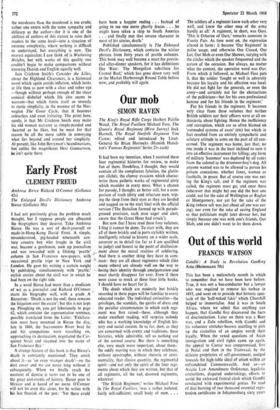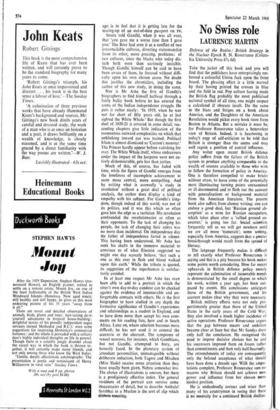Out of this world
FRANCIS WATSON
This has been a melancholy month in which to remember that we have been here before. True, it was not a bus-conductor but a lawyer who was required to remove his turban in 1893, and went on to provide that historic spec- tacle of the 'half-naked fakir' which Churchill helped to immortalise. And it Was in South Africa, where we admit that anything can happen, that Gandhi first discovered the facts of discrimination. Later on there was a Boer war, and a Zulu rebellion, with Gandhi and his volunteer stretcher-bearers scuttling to pick up the casualties of an empire worth their loyalty. When the vexed questions of Asian immigration and civil rights came up again, the appeal to Caesar was compromised, first in Natal and then in the Transvaal, by the delicate proprieties of self-government, nudged towards the high-table ideal of union within an enfranchised Commonwealth. And so—an Asiatic Law Amendment Ordinance, legalistic contortions, disputed undertakings, efforts to avoid the awkward frontal clash which Gandhi conducted with experimental genius. To read of that burning of two thousand essential regis- tration certificates in Johannesburg sixty years ago is to feel that it is getting late for the tearing-up of an out-of-date passport on TV. Smuts told Gandhi, when it was all over, that 'you gave me a worse time than I gave you.' The Boer had seen it as a conflict of two irreconcilable cultures, diverting statesmanship from its other, more pressing, problems: of two cultures, since the blacks who today dis- turb both were then curiously invisible. Though Gandhi himself can be said to have been aware of them, he focused without diffi- culty upon his own chosen cause. No doubt this justifies the chroniclers, including the author of this new study, in doing the same.
Nor is Mr Ashe the first of Gandhi's biographers to find himself halfway through a fairly bulky book before he has entered the arena of the Indian independence struggle. He puts it rather nicely : 'In 1919, when he was not far short of fifty years old, he at last sighted the White Whale.' But though the first duel of 1920-21 is covered in some detail, suc- ceeding chapters give little indication of the momentous outward complexities on which that unblinking inward eye was trained. Political Islam is almost dismissed as 'Curzon's monster.' The Princes hardly appear before vanishing for ever. The White Whale itself, whose endeavours under the impact of the harpoon were not en- tirely dishonourable, gets less than justice.
Much of this, of course, has faded with tittle, while the figure of Gandhi emerges from the loneliness of incomplete achievement to seem more central, more compelling. And by writing what is avowedly 'a study in revolution' without a great deal of political analysis, the author does display a kind of empathy with his subject. For Gandhi's king- dom, though indeed of this world, was not of its politics, and it was this which so often gave him the edge as a tactician. His revolution confounded the revolutionaries as often as their opponents. To the task of changing his people, the task of changing their rulers was no more than incidental. On independence day the father of independence fasted in silence. This having been understood, Mr Ashe has sunk his shafts in the immense material to convince us of what Einstein suggested we might one day scarcely believe, 'that such a one as this ever in flesh and blood walked upon this earth.' While the tribute is quoted, its suggestion of the superhuman is satisfac- torily avoided.
In at least one respect Mr Ashe has even been able to add to a portrait in which the sitter's own day-to-day candour can be checked against the evidence of innumerable and un- forgettable contacts with others. He is the first biographer to have studied in any depth the formative significance of Gandhi's experiences and relationships as a student in England, and to have done more than accept his own com- ments on his reading lists, here and in South Africa. Later on, where selection becomes more difficult, he has not used it to conceal the eccentric or the aberrant. The symptoms of sexual neurosis, for instance, which Gandhians, but not Gandhi, attempted to bury, are honestly faced. In the planetary system of attendant personalities, unmanageable without deliberate reduction, both Tagore and Miraben (Miss Slade) receive more attention than they have usually been given, Nehru somewhat less. The choice of illustrations is uneven, but there is a prodigiously effective index. The general vividness of the portrait can survive some inaccuracies of detail, but to describe Ambalal Sarabbai as a Muslim is the sort of slip which Aisiartaincaning.







































 Previous page
Previous page